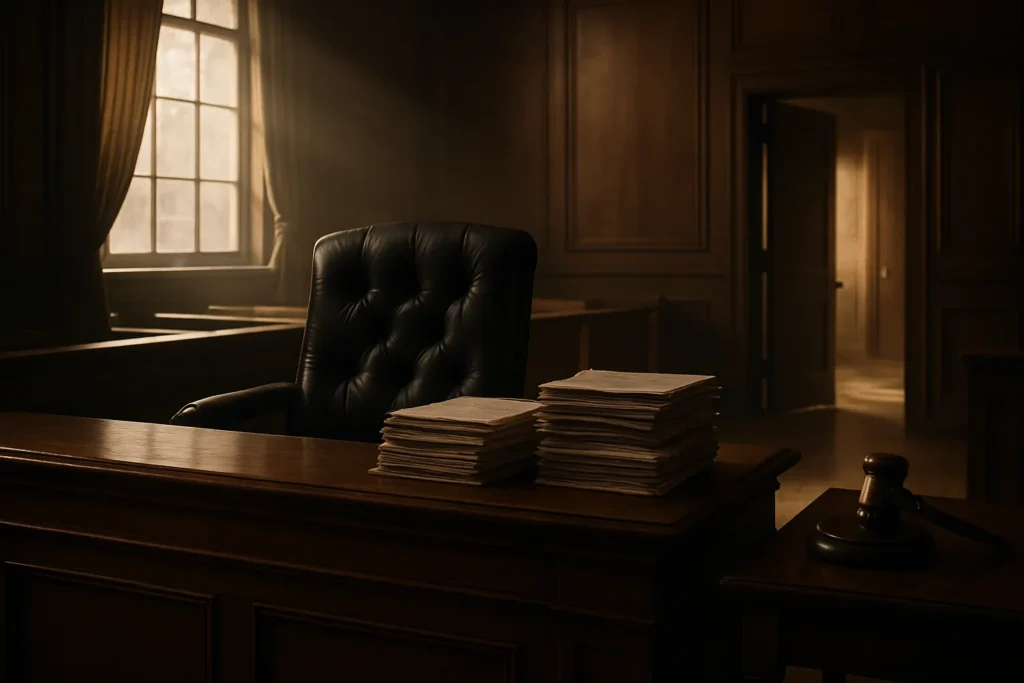The Day a Courtroom Became a Battleground
If you walked into Newton District Court one chilly April day in 2018, you might never suspect you were about to witness a modern flashpoint in the national immigration debate. Yet that’s precisely what happened when Judge Shelley Joseph allegedly facilitated the exit of a Dominican national, Jose Medina-Perez, quietly steering him out the courthouse backdoor—years before the case would ignite headlines and public outrage.
Medina-Perez, as court records confirm, had previously been deported twice and was legally barred from reentering the United States until 2027. On that day, he faced charges related to drug possession and a fugitive warrant from Pennsylvania. Lurking in the courthouse lobby was an Immigration and Customs Enforcement (ICE) agent, waiting to detain him. As lawyers huddled by the judge’s bench, Joseph called for the courtroom’s audio recorder to be switched off. For 52 seconds—a silence that’s now legendary in Massachusetts legal circles—conversations were shielded from public record. Moments later, Medina-Perez slipped out a different door, bypassing ICE entirely.
This fleeting episode thrust an otherwise unremarkable courtroom into the center of a culture war, with Joseph herself painted alternately as a villain subverting federal law or a principled public servant standing against what many saw as the Trump administration’s draconian immigration tactics. The divide underscores how local acts of conscience can become national political Rorschach tests.
A Judge, a System, and the Politics of Enforcement
What motivates a sitting judge to risk her career and possible criminal conviction? For many in the legal community, Joseph’s story sparks an uncomfortable question: At what point does discretion become defiance? Her defense argues she was swayed by the unique circumstances—a nonviolent defendant facing the prospect of permanent exile for what amounted to low-tier drug charges, all set against a backdrop of zero-tolerance directives from President Trump’s White House. Legal experts, such as Harvard Law professor Laurence Tribe, suggest that all judges exercise discretion, but intentional secrecy and avoidance of federal authorities cross key ethical boundaries.
Joseph’s defense counsel, Elizabeth Mulvey, emphasized in her remarks that the judge has not been convicted of any crime, and her actions—now amplified in public memory—have grown into something of a myth. “This story, told and retold, is often stripped of nuance or context,” Mulvey insisted. Beyond that, Joseph’s supporters stress the moral complexity of enforcing immigration law when it intersects with issues such as due process, racial profiling, and the trust immigrant communities place in local courts.
The judicial misconduct hearing, presided over by retired Judge Denis McInerney, doesn’t ask whether Joseph committed a crime (federal charges were dropped by the Justice Department in 2022), but rather if she violated the code of judicial conduct by failing to uphold the law and by obstructing justice. Her defense attorney, David Jellinek, openly admitted to requesting the off-the-record sidebar, acknowledging he needed to broach something “right on the edge of acceptable.” It’s a confession that complicates the public’s understanding: Are these criminal acts or compassionate bending of impersonal rules?
“This story, told and retold, is often stripped of nuance or context.” — Elizabeth Mulvey, defense counsel for Judge Joseph
Trump-era policy put local court officials between the hammer and the anvil: fundamental duties to uphold justice versus the specter of federal immigration crackdowns. According to data from the Transactional Records Access Clearinghouse (TRAC) at Syracuse University, ICE arrests at courthouses spiked dramatically between 2017 and 2019, fostering fear among immigrants that even reporting a crime could lead to deportation. This climate bred deep distrust—one Harvard Kennedy School report noted a double-digit drop in domestic violence reports within immigrant communities, as victims feared ICE more than their abusers.
The Aftermath: Ethics, Accountability, and the Path Forward
Decisions from Joseph’s misconduct hearing—due within 30 days—will reverberate far beyond Newton’s courthouse. The Massachusetts Commission on Judicial Conduct has limited power; it can only recommend discipline, not removal. Judge McInerney’s findings could range from a slap on the wrist to calling for Joseph’s resignation, but the ultimate fate lies with the Supreme Judicial Court of Massachusetts.
For advocates of progressive judicial reform, the crux of the argument is grounded in the judiciary’s independence and its core obligation to defend due process and equal protection under the law. Patriotically-minded liberal legal experts warn, however, that once the line between principled protest and lawlessness blurs too far, the legitimacy of the judiciary itself can fray. As former U.S. Attorney Joyce Vance notes, “Judges are not above the law, but they are vital bulwarks against its abuse.”
Beyond the fate of a single judge, the episode forces a reckoning: What is the role of local courts in the federal immigration machine? Should judges act as mere cogs in an enforcement apparatus, or use their discretion to shield vulnerable populations from what they see as unjust laws?
Accounts like Joseph’s stand in stark contrast to recent conservative pushes for mandatory cooperation between local law enforcement and ICE. Policies such as Trump’s notorious “zero tolerance”—with its widely condemned family-separation consequences—demonstrate the real-world toll of dogmatic enforcement. A closer look reveals that such rigid stances have often proven not only cruel but counterproductive, undermining public safety and fracturing trust between entire communities and the legal system.
As Joseph’s case approaches its awaited decision, it serves as a critical meditation on justice, empathy, and the proper limits of judicial discretion. Progressive voices, rightly skeptical of unchecked government power, would do well to demand both integrity from the bench and compassion in its application. No matter where you fall on the issue, one truth stands clear: the choices made in the heat of a single afternoon can spark debates lasting years, rippling outward to shape the moral fiber of our justice system and national identity.

